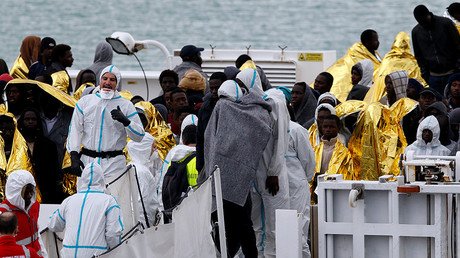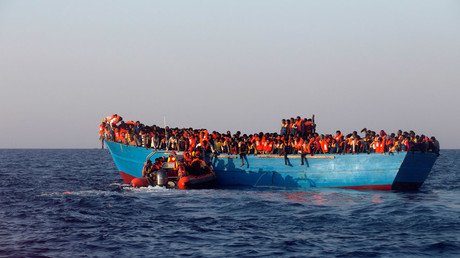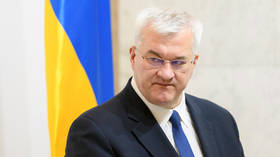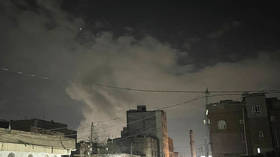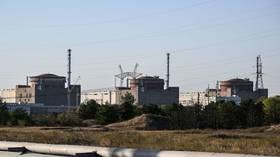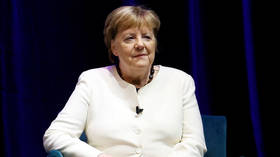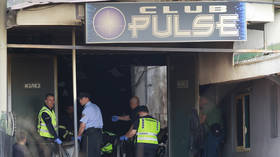Italy secures backing of Libyan mayors to curb human trafficking
Italian Interior Minister Marco Minniti has met with the mayors of ten towns in Libya’s southern desert region to convince them to overcome differences and back the struggle against migrant smuggling through Libyan territory into Europe.
“The meeting took place in Rome,” the Interior Ministry’s chief communications officer, Felice Colombrino, told RT, confirming reports about the talks.
The Libyan officials who came to Rome “signed an agreement to reconcile conflicts and try to reduce illegal immigration from Libya,” Colombrino stressed.
The discussions apparently took place as the Italian-Libyan commission, which is tasked with activating joint operations to combat illegal immigration, met in Italy’s capital following a deal reached by both sides earlier this month.
Italian La Stampa reported earlier that mayors from Fezzan, Libya’s southwestern region, took an unmarked aircraft to Rome on a “top secret operation” to discuss the agreement. Other news publications confirmed that the meeting was taking place, however, so it was hardly a secret.
Fezzan, which is twice the size of Italy, is inhabited by only 400,000 people. The huge desert region is regularly crossed by caravans of smugglers who deliver migrants from Niger’s border to the coastal regions, where they are placed on boats heading for Europe.
For their help in stopping human trafficking, the Italian authorities reportedly offered the Libyan delegation economic aid, investment, and equipment, such as drones and access to satellite technology for surveillance purposes.
The deal between the mayors and the Italian government also envisages investment in Libyan healthcare, transport, education, renewable energy, and research. In addition, it includes funding to help the Libyan coastguard intercept migrant vessels and for training frontier guards.
New EU deal to curb migration via Mediterranean is likely to make matters worse – #MSF to RT https://t.co/MA4t5myuPf
— RT (@RT_com) February 3, 2017
While the negotiations successfully led to a deal, some of the mayors initially opposed the idea of establishing EU-funded detention centers to hold migrants in Libya.
“The mayors overcame their tribal differences and offered their full collaboration with the deal — they even asked for its implementation to be accelerated,” an Italian government source told the Times.
Among the mayors who attended the meeting, were those from the cities of Murzuq and Ghat, as well as Sabha, a major smuggling hub on the border with Algeria.
“Our priority is to support our own sons instead of allowing for illegal migrants in centers,” Sabha Mayor Hamed Al-Khyali said, as cited by Reuters.
Meanwhile a senior ministry source told Reuters that the mayors “expressed their support for executing and implementing the agreement,” calling the deal “an important step because of the difficulty in controlling such a vast territory.”
The initial agreement on cooperation in combating human trafficking was signed by Italian Prime Minister Paolo Gentiloni and the head of the UN-backed Libyan unity government, Fayez al-Serraj, on February 2.
An Italian-Libyan commission tasked with working out the technical details of the accord met in Rome on Monday. The next meeting is scheduled for March.
Under the February 2 deal, local authorities in Libya’s southern regions are expected to establish patrols and close off the southern border that serves as the “main gate” for sub-Saharan migrants trying to reach Europe. Italy will reportedly provide money, training, and equipment to the UN-supported Libyan government in Tripoli so that it can strengthen its coast guard and control over its borders.
Libya has fallen into chaos since 2011, when its former leader, Muammar Gaddafi, was toppled and murdered during a civil war, in which NATO and its allies supported the rebels. Once a prosperous country that served as a migration buffer zone between Africa and Europe due to Gaddafi’s policies, Libya has turned into a major human trafficking hub since his demise, as clan-based militias have capitalized on opportunities to profit from people smuggling.
Europe has seen an unprecedented flood of migrants arriving since 2014. One of the favored entry routes takes asylum seekers across the central Mediterranean. They often land in Italy, the second largest recipient of arrivals, after Greece, according to Europol. More than 180,000 migrants were illegally smuggled from Africa into Italy on board unseaworthy and overcrowded vessels in 2016, according to the UN refugee agency.
